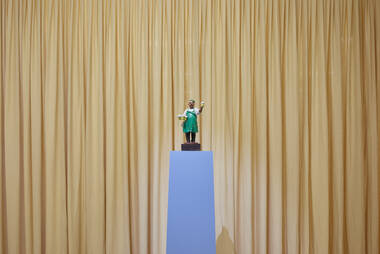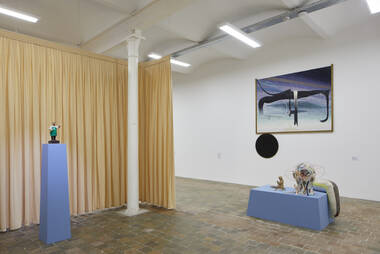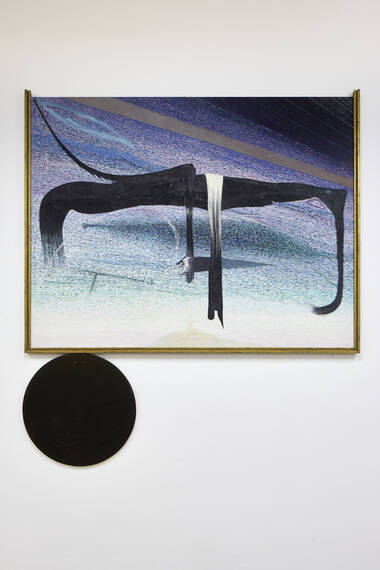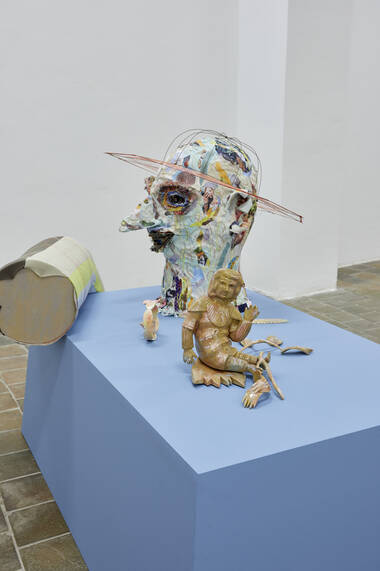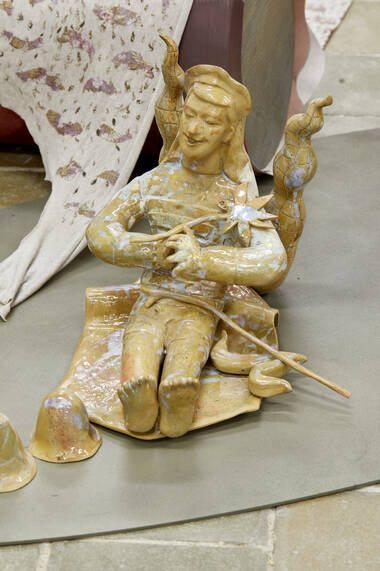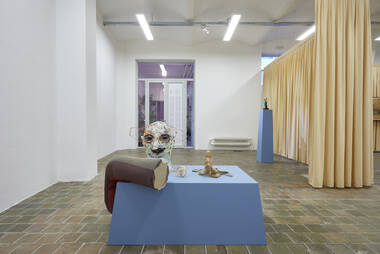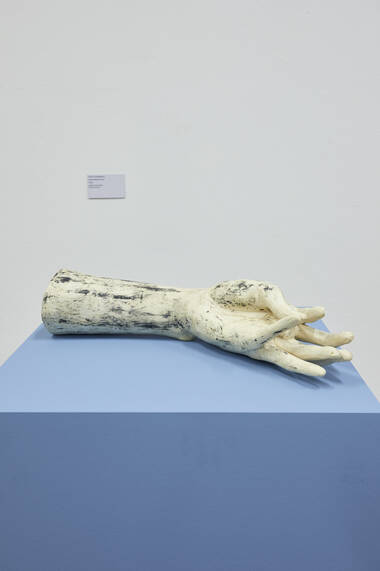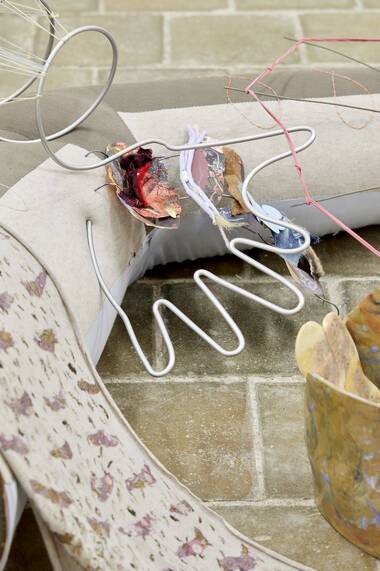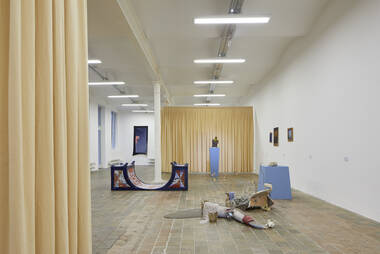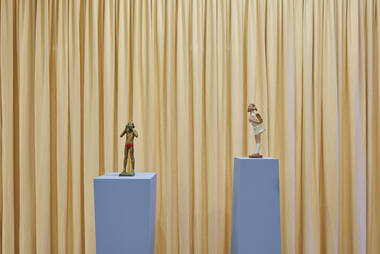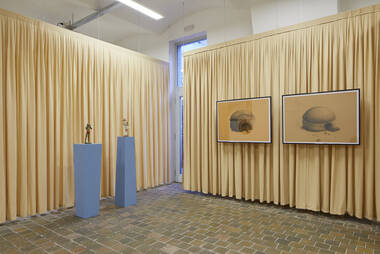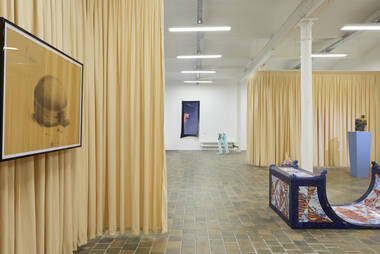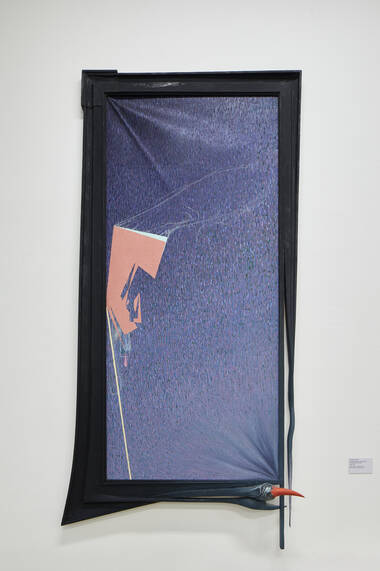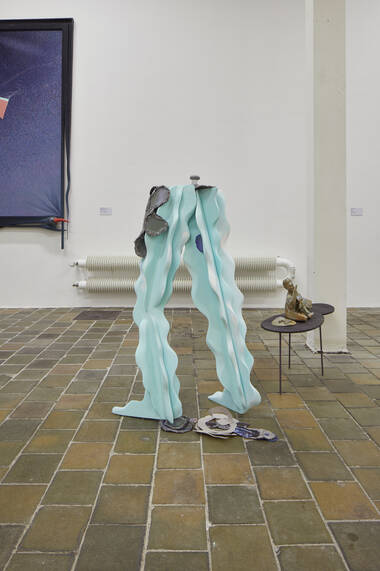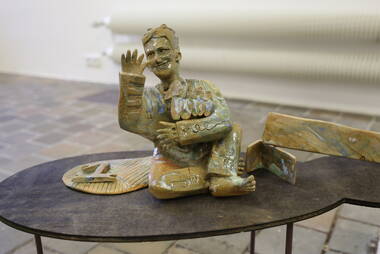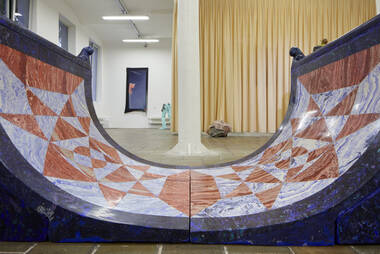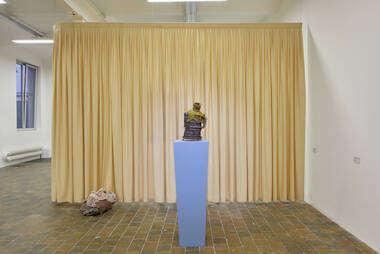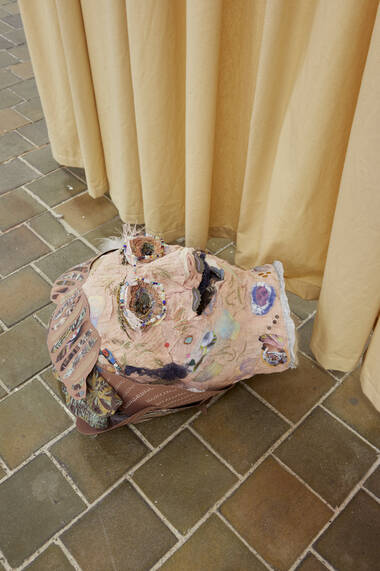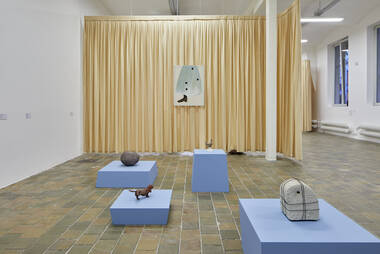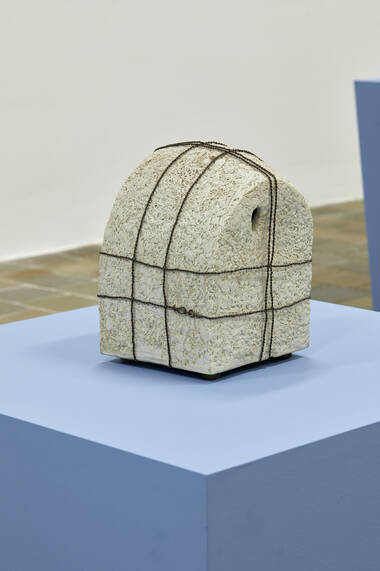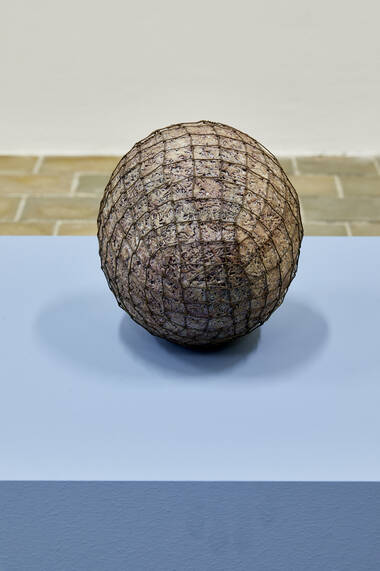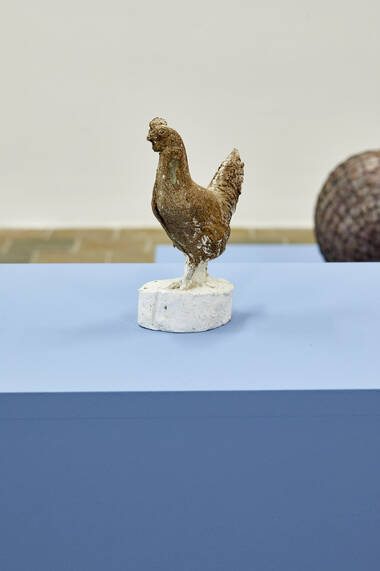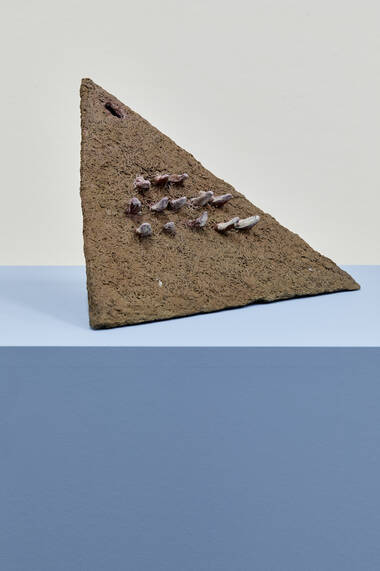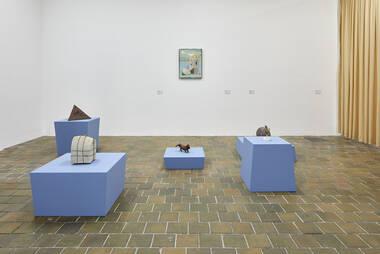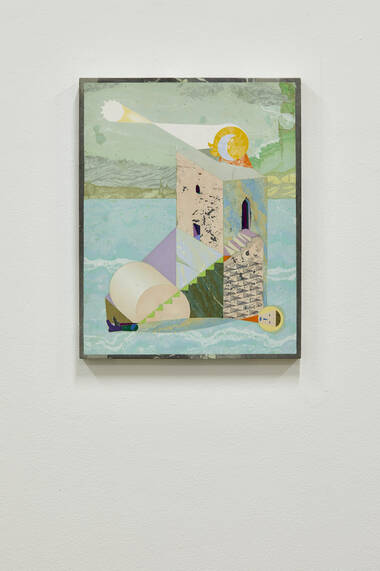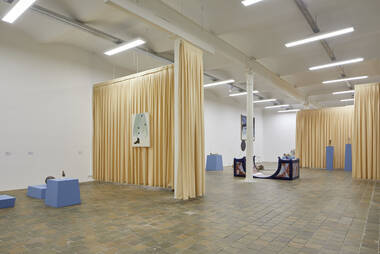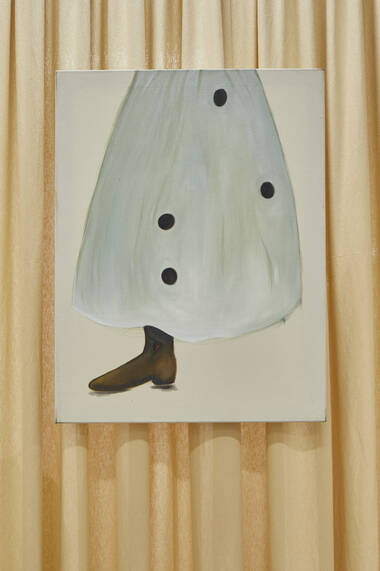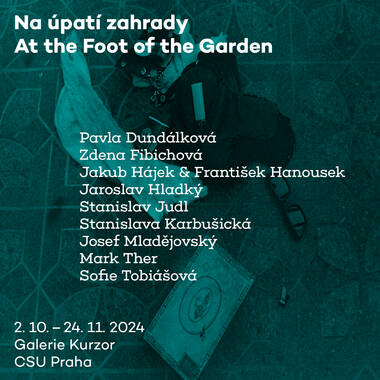At the Foot of the Garden
Pavla Dundálková, Zdena Fibichová, Jakub Hájek & František Hanousek, Jaroslav Hladký, Stanislav Judl, Stanislava Karbušická, Josef Mladějovský, Mark Ther, Sofie Tobiášová
2. 10. – 24. 11. 2024
curator: Marek Meduna
collaboration: Zuzana Blochová
graphics: Jan Šerých
It is said that art is a foggy mirror in which everyone is free to discover whatever they want. Every feature, every aspect can be spun in such a way as to fit our preconceptions, our beliefs. It must be assumed that no exhibition can be constructed. If you want something real, you need decades, twilight, dawn, a network of rhizomes and wires that connect and divide. A work of art is a formalised fragile thing that stands outside the contradictions of theory and the rhetorical tricks deployed to win this or that controversy.
The external structure of the human body preserves a basic symmetry, but inside all the organs, which increase their active surface area by means of various types of wrinkles and coils, are positioned in a completely asymmetrical way. They utilise space to the full, as though a multitude of possessions had to fit into a small suitcase. But every journey leads primarily through time. Many physical processes need sufficient time to unfold, and this is materialised by the meanders of the metabolism. The entrance becomes an exit upon leaving the gallery, and after climbing the hill, you have to descend. In a Rorschach test the anus merges with the mouth, defecation with digestion. The hands are basically symmetrical, though each has a different purpose and a different set of skills. Old age can be metaphorically likened to youth, death to birth, but innocence, experience or powerlessness have quite different proportions in both parts of human life. The claim that the path leads through time is repeated from the moment the algorithm begins to anticipate which word I will have written a moment later, what impulse I will succumb to – right up to the generation of the smooth diameter of the misted up mirror. The inverted repetition is one of the shapes that returns and which, unlike internal processes, is intended primarily for the eyes.
We believe we are opening up to the world and we pay for this with a blindness to things around us. Incomprehensible is the ignorance with which we decide what concerns us and what does not. Every notion, every concept, even the ones that proclaim the unity of opposites, is a type of visor that can be used to shield other possibilities of interpretation. Just as abstraction allows us to get rid of the vertigo of the multitude of particularities. The more artfully the prism is built around symmetry, for example, the more the spectators looking through it resemble that little boy who clamours to pee from the balcony in order to extinguish the orange-hot disc of the setting sun.
Words can be refined, their edges frayed, their core extracted, moving at the peripheries of conventionally understood meaning. Things can be looked at head on or askance. We must to distinguish visual symmetry from the conceptual and abstract. In the first instance it suffices to fold the paper and cut out any shape. In the second, the emptiness of one side of the work can be balanced by the fullness of the other. The publican serving beer is equated with a view of a darkened full moon. Behind the dense clouds there is an asymmetrical conflict between instinctive reactions and the refinement acquired by upbringing.
Prejudice in the form of “beauty is good” is one of the cornerstones of art, a play on the audience’s expectations. It is the basis of the “dazzle” effect, when something so beautiful catches our attention that we do not notice the hidden deep shadows. But actors of the art world have changed this game more than once: that which is not beautiful does not lead to darkness. That which is created with more than a small portion of ineptitude cannot be manipulated and is a priori without shadow – and therefore good. The manipulation of the viewer’s expectations remains, but the methods are transformed. Artists and curators must therefore above all be distrusted.
---
Pavla Dundálková
She had to put her calling temporarily on hold. Bystanders felt she had shed her skin. It’s growing, expanding in all directions. What’s up is down. Shallowness was being transformed into vastness. She laid small souvenirs behind the elastic membrane of urgent duties. Washing, ironing, cooking, being a step ahead, minding her own business and smiling. The last above all. A ruffled, loosely flowing fabric stretched across the room. It divided the space in two. It was easy to cross, but far from visible. An endless, free-floating feed of rising standards from Instagram permeated the nearby space. Influencers mingled with the cooing of pigeons on the windowsill. She looked up at the window and saw only the passing of time. Everyone needs certain conditions to live. Things were different in Bertold Brecht’s time than today. Entitles and rights dug like thorns into her soft skin. She typed her name into Google. Over the years, information has been hierarchised in different ways, the algorithm has changed without this being visible in its instantiation. At first glance everything remained the same. She opened the box and walked deep into the forest. The path turned into a trail. The trail dissolved into dense undergrowth from which the rustling of hidden animals could be heard. She wanted to coax a few dryads, though she knew not why. She hadn’t even seen their silhouette yet. Brokilon was silent. She set up camp for the evening. She sat staring into the darkness of the chest. She chewed foxglove on her tired, aching body. When she awoke in the morning, they stood silently around her. Slender and blending into their trees. One by one they told her that the sight of soil, dirt, mud and cracked earth gave them the greatest pleasure. The soil has its suppleness, its colour, its texture and its latent shape. They feel a piece of the whole world in the palm of their hands. What excites them the most is the space inside, where the soil comes alive and the seed becomes the germ for photosynthesis and new life. So they feel included in its course. The parable of the cave is turned inside out. The stalactites and stalagmites were eating into the open space. Truth has divided itself into too many simultaneous and individually undemanding tasks. There are doors that have been closed until the end of the world.
---
Zdena Fibichová
They finally got an exit visa permit and a promise of foreign currency, so they could travel to France again after fifteen years. Her husband drove. Literally and figuratively. Her ambition was so much less than his jealousy. Given her state of health she was pleased to see white clouds scudding across the sky, the pastures full of cattle and sheep, the local people smiling at each other. She focused on her bare feet, which were awash in the cold water of the Atlantic. Granite boulders towered behind a low rocky knoll. Some had been brought here by humans, the rest by a large land glacier during the Pleistocene. The trees were bent inland under the onslaught of constant combing. The final text in her catalogue was lyrical and alluded to the plight of women. She had made up her mind. When she met its author, she preferred to keep her opinion to herself, no point in creating bad feelings from the off. She wondered whether she had sensed her annoyance. She hoped she hadn’t. She had after all praised her, something she was quite good at. She flipped through the housewives’ magazine, in which the editors shared with their large readership various ways to at least partially control an unyielding mass. How to care for the moisture of clay, the fineness of the yarn, the regularity of the warp and the smoothness of the seams. The carefully groomed and polished rooms represented an impermeable cell, a moisture-breathing lair into which her ideas of the future, of destiny and equality were crammed. With the shard of a dried flower, she cut a hole in the damp earth and stepped inside. She struggled to experience the transition between one and the other, a disappearing stream of hot blood washing her feet. She’d coated her cracked heels with the remnants of sour milk last Sunday. They were slowly healing. The strong pavement was slippery. She’d better pay attention. She stared into the darkness through the candle that turned time into matter thus establishing a basic black velvet unity. She retained the relief of the candle flame for future days.
---
Jakub Hájek & František Hanousek
I bet on the borderline case, he said. My mum always advised me that if I wasn’t sure, I should bet on the borderline case. And I really wasn’t sure what to do. Does it work? The other guy was taunting me. Not really, he admitted reluctantly. A teacher at the Academy once explained that the more you argue with each other, the lower the quality of the artefacts you create, and vice versa. I assumed my classmates didn’t know what vice versa meant, so I wanted to explain it to them. I said: if you argue all the time, you will create utter garbage, and if you are in harmony with each other, your art will attain the highest quality. After all, even the wise poppy in the bedtime story Poppy Doll and Butterfly Emanuel produced methadone of the highest quality in the world. But it stinks here, remarked another. So air the space. But that’ll allow the cold in. They taunted each other, their words mingling with the odour of the room. The acted out a conversation between an American ContraArrow breadtuber and an elderly psychiatrist about a positive approach to AI. The young man again drew on one of his sophistic tricks. What a dickhead, they all groaned simultaneously. Outside the windows the dropping branches of the mature spruce trees swayed. Torrential rain drummed on the tin roof. They’d been cutting wires for three hours. They sorted letters, dealt with emails, answered messages on Instagram, recorded a few reels. The convector heater was contributing to the global warming of their studio, the fumes from their wet clothes rising to the ceiling. The collection of interviews with Vladimír Špidla had pages glued together and was warped by moisture. The former prime minister spoke credibly but not very attractively. In his words, the world’s differences and conflicts could be linked by the brotherhood of metaphor. But people, as always, preferred drama and immaturity. The deployment of buttocks versus the procreation of offspring. Have you read it? No, but I’ve heard that all activity is merely situational and positional negotiation. They played trump cards seeking to triumph in pulling the ugliest artistic performance out of the cardboard box of the past. Not the night, but the manner was key and the words Trump and triumph stood at a chilling intersection. Don’t worry, he said. On the contrary mate, out of the rubble of the left will arise hope, he retorted. Historical disempowerment is an illusion and borderline cases are bullshit, he continued. Vice versa, look what we’re doing, digging through the garbage of internalised capitalism.
---
Jaroslav Hladký
You know what? Let me tell you a story. I once had to make a figure for a pedestal standing at a factory entrance. She had her house keys hanging around her neck. She was smoking, hidden from the teachers of the school of life, who were sitting in the assembly room around the next corner. I modelled the severed hands. They suddenly came to life. They walked out of the building into the hustle and bustle of the street. The flow of people swept them along and the surface closed in behind them. Meanwhile a woman sewed a uniform for a puppet the size of a Czech sculpture. The puppet took a deep breath and said: “To your good health.” I found myself thinking either good health or a quick death. Seriousness is no longer appropriate, ridiculousness will be the new seriousness, though tin from the late 1960s also weighed something. “Good morning maestro,” the erection in the mirror still greets me in the mirror every morning. You know, I remembered the other day how my hands, before leaving my eyes, asked: “Maestro, why are our thumbs so strangely deformed?” Pay homage to this, I replied, for this is a modeller’s thumb. What the use is I don’t remember, my memories blend into my reading. The puppets of individual organs and functions gradually recede to the horizon of memory. Since I don’t have a computer, it wasn’t till the TV news that I learned that the missing hands had been found. They had apparently been buried in a garden in Central Bohemia more than thirty years ago. When they were brought to me, I helped with their recovery. Bronze workers then recast them, coppersmiths cultivated them. The hands came back to life and remembered that they had gone to meet their fate. Every theme was utilised and digested complete. Their existentialism was transformed into attentiveness and simplicity. Humour into open arms. The apparent evil of matter into the rounded shapes and rich colour of conformism. The geese, separated according to the opinions held and individual homes, lined the road for decades, then the march picked them up, along with the cackling and hissing, and they went to feast their eyes. I picked up a goose quill and wrote my own oration. I’m the one who’s got things going pretty well. It used to be called having a knack. But praise doesn’t make anything better, so don’t ascribe any importance to it.
---
Stanislav Judl
Returning to the studio after Sunday, he heard two gods arguing high in the sky. Their voices broke against the clatter of passing trams, the clamour of children at the foot of the garden, the murmur of people called to work by society. He was one of the them, of simple origin, of treacherous ambition. His wife told him not to be Manichean or petty. He had indeed been called, but he must be present in spirit, dusting, playing with the children. A dark indigo rose upward into the helmet of his face. People told him his new paintings had a special power. They associated their basic style with the imaginary figure of the creator, separated from his work by an impenetrable wall. After all, the artist had already been dead for some years. Both gods were chatting while playing some kind of simulator. The first-person view was ingrained on their minds. The godlike brain had maximum plastic potential, which is why every morning he woke up revived but without memory. He observed the dusty streets, empty shops covered with scaffolding and the fluttering of torn burlap. Christmas was again without snow. People were apathetic and grey, the roads salted. The apartment was silent: they had been waiting for several years for a phone line to be connected. The absolute had been fractured into glittering facets of paradox. He imagined a dialogue that sought understanding. He separated the various components of his figure, one ascending and the other lingering at the bottom of the stairs to post a letter in the mailbox. He imagined their objections and their grief. No words could be explained, no actions pointed to anything. An eternity was played out between the stove being switched on and the coffee boiling. Divine voices argued more and more violently. The murmur of darkness arched upward, perhaps toward the light, perhaps into the void. The orbits around planet Earth were still empty back then.
---
Stanislava Karbušická
Around the lookout tower, strips of autumn fields stretched far and wide. The spiral staircase wound around an axis of rage and anger. The unintegrated shadows of negativity disguised themselves as distant visibility. The Bohemian Central Highlands came physically close to touch through the autumnal, highly transparent air. The oily smoke of the roast shashlik of Ukrainian families rose from the ravine. The houses lining the batik of meadows and fields, the glaze of the industrial zones, the undulating stream of the highway were inhabited by a middle class of new invented symbols. Everything swirled with movement. The outside connected with the inside through sensory and material exchange. Her daughter drew a figure woven from chalk stars in the playground pace. She laboured over the manicured landscape of the present, covered from head to toe in dirt. She recalled the legendary homeless man of Prague, who made all of his clothes by hand from clothing, plastic and scraps of advertising leaflets being handed out. He was a newcomer from the future who soon died in the present. Oranice exhaled industrially supplied nitrates. The entire globe was and will be alive. Mummy, you’ll buy me an ice-cream. She looked down and saw the melting matter and the buzzing of wasps. Blue merged with yellow, yellow with banana, banana with peeling, peeling with essence, essence with the essential, the essential with relations and these with the details from which her memory emerged. Her boyfriend returned from the pub, she asked how their mutual friends were. He shrugged and replied that they had been talking about artificial intelligence. The daughter was sighing softly behind the curtain, the boyfriend fell asleep and began to snore. She closed the door. Translucent layers of watercolour silently pulled back the curtain of the summer night. She modelled a reclining figure, her clay body unafraid of relationships or its own transformation.
---
Josef Mladějovský
If you place a building in the centre of a plot, you lose a sizeable chunk of acreage that you could have utilised in a meaningful way. Good land will be increasingly scarce, not to speak of friendly neighbourhoods. Fortunately, this house is on the fence. The driveway is lined with young fruit trees. Mostly plums. The real estate agent has been searching for more and more superlatives. The whole family liked the Fibonacci sequence geometry inscribed beneath the basic layout of the garden and house. We still have to check in the land registry to make sure that everything was as it appeared at first glance. The wife was delighted. The silhouette of the Jizera Mountains loomed over the gabled roof of the house. They rose in a single break rather than gradually from the plain, through the foothills to the highest peaks. The formerly bare slopes were beginning to bristle with young trees. The agent said: square, he objected to pentagon, you have to take the well into account. The agent winked impishly, pumped hands vigorously and was gone. The water from the well was icy cold. On the way back, they discussed moving, changing schools and jobs. The motorway was empty so roadworks didn’t cause the usual traffic jams. Conversation meandered and sedimented in the veining of marble. The truth contained in prejudice shone into the darkness and up close could be seen pelting spiders’ webs and swarms of tiny insects. The truth of myriad sediments stood out in geological profile beneath the living conversation. The past established boundaries that could be crossed as far as nearby Ochranov. He set a route in the navigator and they followed it to their old home. Relocating was hygiene that would allow them, and him in particular, to rid themselves of parasitic household and studio objects. Many superfluous ideas, too, he hoped. Although he had always thought of empty space as a lie, he came to appreciate the emptiness more and more. He decided to replace certain ideas with simple action. It was necessary to come to terms with them as well as with the inevitable presence of bacteria.
---
Mark Ther
He sat in the back seat of the purring Mercedes. The aroma of the leather seats floated just below the base note of the scented tree. Opera singing and unintelligible generic German poured from the radio. Grandma and Grandpa argued about the past, each remembering it differently, each speaking their own dialect. A queue of ants was said to be winding its way down the garden path to the forgotten pastries. The sweet smell of decay and forgetfulness lingered low, almost indistinguishable beneath the words. The narrative broke down into individual droplets that echoed the interior of the car. When he leaned in, he saw the passing landscape in the spherically distorted windows. He took off his glasses and the world suddenly wrapped itself in images and aromas, in carefully guided individual gestures. He knew that previously art had been framed by convention as a certain place in society. The framing guaranteed predictable attention and disciplined expectations. He donated his immortality to horcruxes relating to his family history, to the melancholy of his childhood, to the treasure trove and mystery of video tapes of West German provenance. The objects conjured by him made him immaterial, exempt from the cycle of matter, from decay and regeneration. Everything essential came to him by chance. Through the dynamics of identities he participated, along with other outliers of his generation, in expanding the frame of convention. His distraction, where the frame was everywhere and nowhere at the same time, disrupted the symbolic order and caused a collapse of the attention paid to the objects of art. It made culture an elemental catastrophe that allowed more and more steps in the direction of the domestication of the first of all domesticators, i.e. Man. Except for cats, of course, in the case of which it was not at all clear who had conquered whom. After all, he had always preferred cats to dogs. Just as he had always preferred the unfathomability of chickens, the darkroom deep behind the clucking in the none-too-polished backyard of local history.
---
Sofie Tobiášová
The sun was shining. Outside the open windows blades of dry, uncut straw crackled. She could hear eyes far beyond the branches, see buzzards circling over the hilltops. Soon it would be noon and the sun would drive the last remnants of the breeze from the deeply cut valleys behind their village. Her dreams turned into films about ears that had an understanding of other languages. They descended the steep serpentine curves into the harbour town. They circled the valley like water flowing into a drain. She used to think that paintings were meant to enter into a polemic with their predecessors. Or later on, be a statement against entitlement and gender stereotypes. Then, in keeping with the traditional interpretation, she burrowed into painting in the direction of Coriolis force, though the direction of movement was decided by many things, including the family library, early memories drowning in golden green. The paintings thus became nets that gradually relinquished their catches to her. Yachts bobbed in the harbour, seagulls gained height in the rising thermals. Traffic was light. The sound of the occasional passing car was drowned out by a primal splashing, the flapping of linen sails and the cicadas inseparable from the Mediterranean. Though she was not a Swiss mercenary, she could not escape nostalgia, whose stipend was uncertain and irregular. Now turn onto the main road, she said. They drove around the roundabout three times before finding the right turnoff. She circled the territory of painting three times before deciding that the protagonists of the paintings were flesh and blood, that the multiple expositions of experience could be generalised as a discussion of method. The form of illustration did not bear the guilt of free art. The expansion of its boundaries led to feelings of sparseness and confusion. They parked. She got out of the car. Heat bounced off the hot stones. She descended to forms of illustration, squeezed through the narrow passage between definitions to the forever closed books, to the imagination behind the rapid movement of the eyes and wandering paths of the limbic system. At his swearing she got rid of the car keys, even the old Helvetians going into battle set fire to their dwellings. The wind that ruffled her hair carried many familiar voices. They all cursed the magic of the present moment.
Marek Meduna
(transl. Phil Jones)
Courtesy of: Marie Klimešová, Jaroslava Preclíková, Rostislav Vaněk
The program of the Cursor Gallery is possible through kind support of Ministry of Culture of the Czech Republic, Prague City Council, State Fund of Culture of the Czech Republic, City District Prague 7,
GESTOR – The Union for the Protection of Authorship
Media partners: ArtMap, jlbjlt.net, artalk.cz and ArtRevue
